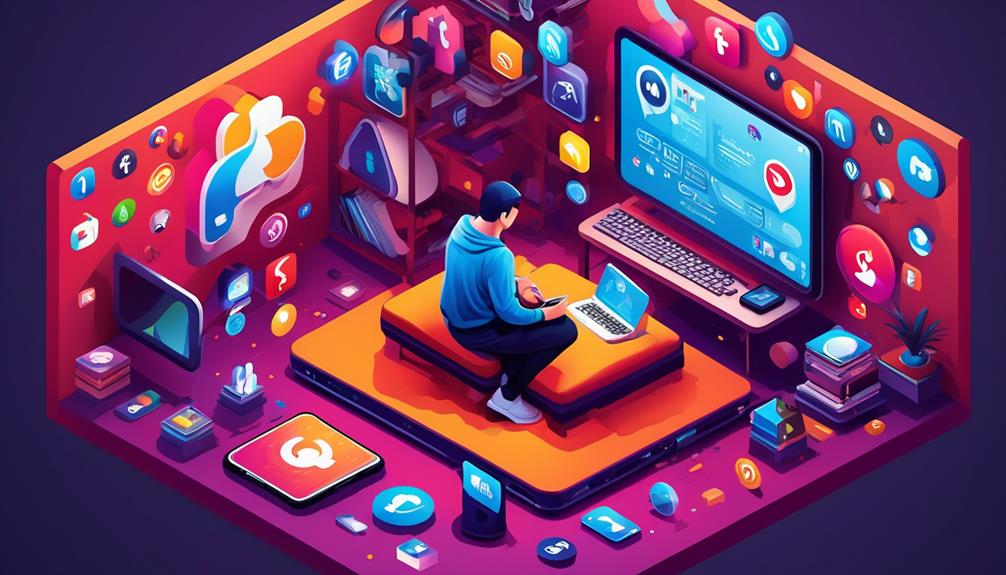As a society, we've become increasingly connected through various social media platforms, and the statistics surrounding social media addiction are quite eye-opening.
The prevalence of social media addiction has reached staggering levels, with the average person spending about 2.5 hours per day on these platforms. However, what's even more concerning is the impact this addiction can have on mental health, particularly for teenagers who are especially susceptible.
The correlation between social media use and feelings of anxiety, depression, and loneliness is a topic that deserves closer examination.
Key Takeaways
- Over 210 million people worldwide spend an average of 2 hours and 27 minutes on social media daily.
- Social media addiction is associated with an increased risk of mental health issues such as anxiety, depression, and body dysmorphia.
- Social media addiction can lead to literal rewiring of the brains of children and teens.
- Young single females are the most affected by social media addiction.
Prevalence of Social Media Addiction
The prevalence of social media addiction is alarming, with over 210 million people worldwide spending an average of 2 hours and 27 minutes on it daily. It's staggering to think about the sheer number of individuals who are caught in the web of social media addiction.
This addiction isn't just limited to a specific age group; it's widespread. More than half of all drivers admit to checking social media behind the wheel, indicating the pervasive nature of this issue.
The impact on younger generations is particularly concerning. Overuse of social media in children and teens can lead to literal rewiring of their brains, raising serious long-term concerns. In fact, 35 percent of teenagers describe their use of social media platforms as almost constant, reflecting the extent of addiction among the youth.
This addiction isn't benign either; it's associated with an increased risk of mental health issues such as anxiety, depression, and body dysmorphia, particularly in young adults.
These statistics paint a concerning picture of the widespread addiction to social media and the potential negative effects it can have on individuals, especially the younger population.
Demographics of Social Media Addicts

As I explore the demographics of social media addicts, it's crucial to consider the age and gender of those affected. Understanding the age groups and gender disparities among social media addicts can provide valuable insights into the factors contributing to addiction and its impact on different segments of the population.
Age of Social Media Addicts
Being part of the 18-29 age group, I find it noteworthy that 90% of us are actively using social media in some form," remarked a recent study on social media addiction. The statistics reveal that 15% of individuals aged 23-38 admit they are addicted to social media, with young single females being the most affected. As age increases, social media usage decreases, with only 40% of the 65+ age group using it. Interestingly, the feeling of being 'somewhat addicted' to social media is highest among those aged 18-22 and 23-38. This highlights the impact of age on social media addiction. Here's a breakdown of the statistics:
| Age Group | Percentage of Social Media Users |
|---|---|
| 18-29 | 90% |
| 23-38 | 85% |
| 65+ | 40% |
These figures shed light on the prevalence of social media addiction across different age groups.
Gender of Social Media Addicts
Gender differences in social media addiction are evident. Over 60% of men and over 55% of women are addicted to social media. Women tend to use social media more than men, spending an average of 2.08 hours a day compared to men who spend an average of 1.81 hours a day on social media.
Additionally, teenage girls are more likely than adults to be addicted to social media. They also experience mental health problems at a higher rate. Girls are more likely than boys to become emotionally invested in social media content and compare themselves to others, which leads to negative self-perception.
It's important to note that social media addiction varies between genders and different age groups. For example, women aged 25-34 spend the highest share of their online time on social media, at 40%.
- Women spend more time on social media than men
- Teenage girls are more vulnerable to social media addiction
- Women aged 25-34 spend the highest share of their online time on social media
Daily Time Spent on Social Media
On average, people spend 2 hours and 27 minutes on social media every day, indicating a significant daily investment in these platforms. This statistic reveals the extent to which social media has become integrated into our daily lives.
It's concerning to note that over 35% of teenagers describe their use of social media platforms as almost constant. Even more worrying is the fact that teenagers who spend between 5 and 7 hours a day using social media are twice as likely to exhibit signs of mental health problems.
Additionally, the data shows that 90% of people aged 18-29 use social media in some form, and 40% of 18-22-year-olds have a social media addiction. These numbers underscore the pervasive nature of social media and its potential impact on mental well-being, particularly among younger users.
As we delve deeper into the issue of social media addiction, understanding the daily time spent on these platforms is crucial for recognizing the scale of the problem and developing strategies to address it.
Anxiety and Social Media Use

Excessive use of social media platforms has been consistently linked to heightened feelings of anxiety. As someone who may be concerned about the impact of social media on mental health, it's important to understand the following points:
- The fear of missing out (FOMO) experienced when using social media can contribute to heightened levels of anxiety among teenagers and young adults. This fear stems from the constant exposure to the seemingly perfect lives of others on social media platforms.
- Social media addiction has been associated with increased instances of bullying, contributing to anxiety and mental health issues in adolescents. The negative interactions and cyberbullying that can occur on social media platforms can significantly impact an individual's mental well-being.
- The comparison and self-perception issues triggered by social media use can lead to heightened anxiety levels, particularly among teenage girls. Constant exposure to carefully curated and filtered content can lead to unrealistic comparisons and a negative self-image.
Understanding these factors can help us recognize the potential impact of social media on anxiety and take steps to mitigate its negative effects.
Loneliness and Social Media Addiction

I can't ignore the impact of social media addiction on mental health, relationships, and socialization.
The constant need for validation and connection through social media can lead to a sense of isolation and loneliness.
It's crucial to address these issues and find healthier ways to engage with technology and maintain genuine social connections.
Impact on Mental Health
The intertwining of loneliness and social media addiction has been linked to increased anxiety and depression among teenagers. This can be attributed to several factors:
- Emotional investment: Teenagers often invest a significant amount of emotions into their social media interactions, leading to increased vulnerability to mental health issues.
- Comparison: Constant exposure to curated and often unrealistic portrayals of life on social media can lead to feelings of inadequacy and lower self-esteem.
- Negative self-perception: Excessive use of social media can foster negative self-perception and body image issues among teenagers.
These factors contribute to the detrimental impact of social media addiction on mental health, highlighting the need for proactive measures to address this growing concern.
Relationship Strain
Linked to the detrimental impact on mental health, loneliness and social media addiction can significantly strain relationships and contribute to feelings of isolation among teenagers. Excessive social media usage has been linked to increased feelings of anxiety and depression, leading to relationship strain. Teenagers who spend significant time on social media are more likely to experience loneliness and fear of missing out. Social media addiction can interfere with sleep, contribute to body dysmorphic disorder, and increase instances of bullying, all of which lead to relationship strain. Suicide rates for teenage girls have doubled, correlating with the rise of social media usage.
| Effects of Social Media Addiction on Relationships |
|---|
| Increased anxiety and depression |
| Feelings of loneliness and isolation |
| Interference with sleep and increased bullying |
Isolation and Socialization
Excessive social media use among teenagers can exacerbate feelings of loneliness and contribute to social isolation, impacting their mental health and well-being. This is a concerning trend, especially considering the following:
- Social media addiction is linked to increased feelings of anxiety, depression, and loneliness, especially among teenagers.
- Teenagers, especially girls, are more susceptible to addiction and negative consequences due to their less developed brains and lack of real-world social skills.
- Overuse of social media can lead to increased instances of bullying, body dysmorphic disorder, and interference with sleep among teenagers.
These facts highlight the detrimental effects of social media on the socialization and mental well-being of teenagers. It's crucial for parents, educators, and policymakers to address this issue and promote healthier forms of social interaction.
Impact on Mental Health

Influencing the mental well-being of young people, social media usage has been found to correlate with increased rates of anxiety, depression, and body dysmorphia. Research indicates that overuse of social media in children and teens can physically rewire their brains, leading to negative impacts on mental health.
The more time young people spend on social media, the higher the likelihood of experiencing mental health issues such as anxiety, depression, and body image concerns. This is particularly concerning for teenage girls, who are more susceptible to social media addiction and its associated mental health problems. Additionally, the still-developing brains of teens make them more prone to addiction and negative consequences, further impacting their mental well-being.
The negative effects of social media addiction can manifest in various forms, including depression, anxiety, and eating disorders, all of which can significantly impact mental health. As a result, it's crucial to raise awareness about the potential mental health implications of excessive social media use, especially among young people.
Social Media Addiction Vs. Drug Addiction

As someone who's observed the impact of social media on mental health, it's important to recognize that the prevalence of social media addiction may surpass that of drug addiction, raising significant concerns about the well-being of young individuals. This shift in addictive behaviors has notable implications, including:
- Accessibility: Social media is easily accessible to individuals of all ages, making it more prevalent than drug addiction, which often requires illegal or restricted substances.
- Normalization: The use of social media has become normalized in society, leading to a higher likelihood of addiction among individuals who may not have been exposed to drugs.
- Mental Health Effects: While both addictions have severe consequences, social media addiction can lead to mental health issues such as depression, anxiety, and eating disorders, which are becoming increasingly common among young adults.
Understanding the impact of social media addiction compared to drug addiction is crucial in addressing the well-being of individuals, especially the younger generation. By recognizing the prevalence and effects of social media addiction, we can work towards implementing strategies to promote healthier usage and mitigate potential harm.
Frequently Asked Questions
What Are the Most Common Social Media Platforms That People Become Addicted To?
I become addicted to social media platforms like YouTube, TikTok, Snapchat, Instagram, and Facebook. Discord, WhatsApp, and Twitter (renamed X in 2023) are also popular. These platforms contribute to addiction, especially among teenagers.
Is There a Correlation Between Social Media Addiction and Certain Mental Health Disorders?
Yes, there's a significant correlation between social media addiction and mental health disorders. Overuse can lead to anxiety, depression, and body dysmorphia. Research shows that the more time spent on social media, the higher the risk.
How Does Social Media Addiction Impact Relationships and Social Interactions in Real Life?
Social media addiction impacts relationships by causing anxiety, depression, and loneliness. It reduces face-to-face communication and meaningful connections. It distorts reality and decreases empathy, affecting offline relationships and social skills.
Are There Specific Warning Signs or Red Flags to Look Out for in Someone Who May Be Addicted to Social Media?
When I spot someone consumed by social media, I notice signs like withdrawal from real-life connections, neglect of responsibilities, and the constant hunger for validation. These red flags wave high, signaling potential addiction.
Can Social Media Addiction Be Effectively Treated or Managed, and What Are the Most Common Approaches to Treatment?
Yes, social media addiction can be effectively treated or managed through various approaches, such as cognitive-behavioral therapy, support groups, and mindfulness practices. Setting boundaries, digital detox, and promoting healthy offline activities are also common methods.
Conclusion
After researching social media addiction statistics, it's clear that the impact on mental health is significant.
Take Sarah, for example, a high school student who struggled with anxiety and loneliness due to her excessive social media use.
By recognizing the prevalence of this issue and its effects, we can work towards finding solutions to support individuals like Sarah and combat the negative consequences of social media addiction.










